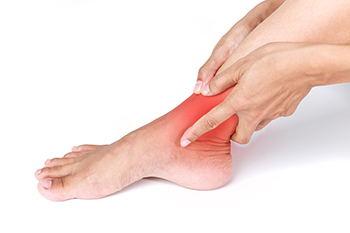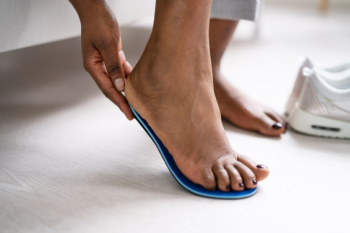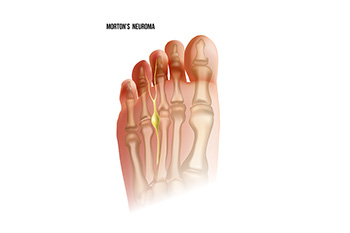
Sudden ankle pain without an obvious injury can stem from various conditions, including arthritis, autoimmune diseases, and structural issues in the foot. Osteoarthritis develops over time from joint wear, while rheumatoid arthritis and lupus can cause inflammation in both ankles. Reactive arthritis, often triggered by an infection, leads to joint pain and swelling. Gout, caused by excess uric acid, can bring sudden, severe pain to the ankle joints. Flat feet or posterior tibial tendon dysfunction can strain the ankle, causing discomfort and instability. Additionally, bursitis, an inflammation of fluid-filled sacs near the joint, can cause swelling and tenderness. A podiatrist can identify the root cause of your ankle pain through a thorough examination and diagnostic tests. They can recommend supportive footwear, provide custom orthotics, and suggest targeted exercises or medication to relieve pain and improve mobility. In some cases, surgery may be advised. If you are experiencing sudden ankle pain, it is suggested that you schedule an appointment with a podiatrist for appropriate treatment.
Ankle pain can be caused by a number of problems and may be potentially serious. If you have ankle pain, consult with one of our podiatrists from Westland Foot & Ankle Specialists, P.C.. Our doctors will assess your condition and provide you with quality foot and ankle treatment.
Ankle pain is any condition that causes pain in the ankle. Due to the fact that the ankle consists of tendons, muscles, bones, and ligaments, ankle pain can come from a number of different conditions.
Causes
The most common causes of ankle pain include:
- Types of arthritis (rheumatoid, osteoarthritis, and gout)
- Ankle sprains
- Broken ankles
- Achilles tendonitis
- Achilles tendon rupture
- Stress fractures
- Bursitis
- Tarsal tunnel syndrome
- Plantar fasciitis
Symptoms
Symptoms of ankle injury vary based upon the condition. Pain may include general pain and discomfort, swelling, aching, redness, bruising, burning or stabbing sensations, and/or loss of sensation.
Diagnosis
Due to the wide variety of potential causes of ankle pain, podiatrists will utilize a number of different methods to properly diagnose ankle pain. This can include asking for personal and family medical histories and of any recent injuries. Further diagnosis may include sensation tests, a physical examination, and potentially x-rays or other imaging tests.
Treatment
Just as the range of causes varies widely, so do treatments. Some more common treatments are rest, ice packs, keeping pressure off the foot, orthotics and braces, medication for inflammation and pain, and surgery.
If you have any questions, please feel free to contact our office located in Westland, MI. . We offer the newest diagnostic and treatment technologies for all your foot care needs.

Custom orthotics can help alleviate foot pain, improve alignment, and support mobility, but not everyone needs them. If you are experiencing persistent discomfort, instability, or issues related to gait, a podiatrist can determine if orthotics are the right solution. Before your appointment, take note of your symptoms, when they occur, and what activities make them worse. Bring your most frequently worn shoes and any previous orthotics if you have them. Your podiatrist will assess your foot structure, walking pattern, and overall biomechanics, and may recommend custom orthotics tailored to your needs. Be prepared to discuss your lifestyle, activity level, and any underlying conditions like diabetes or arthritis that may impact your foot health. If you are having foot problems, it is suggested that you visit a podiatrist for an evaluation and treatment options, which may include orthotics.
If you are having discomfort in your feet and would like to try orthotics, contact one of our podiatrists from Westland Foot & Ankle Specialists, P.C.. Our doctors can provide the care you need to keep you pain-free and on your feet.
What Are Orthotics?
Orthotics are inserts you can place into your shoes to help with a variety of foot problems such as flat feet or foot pain. Orthotics provide relief and comfort for minor foot and heel pain but can’t correct serious biomechanical problems in your feet.
Over-the-Counter Inserts
Orthotics come in a wide variety of over-the-counter inserts that are used to treat foot pain, heel pain, and minor problems. For example, arch supports can be inserted into your shoes to help correct overarched or flat feet, while gel insoles are often used because they provide comfort and relief from foot and heel pain by alleviating pressure.
Prescription Orthotics
If over-the-counter inserts don’t work for you or if you have a more severe foot concern, it is possible to have your podiatrist prescribe custom orthotics. These high-quality inserts are designed to treat problems such as abnormal motion, plantar fasciitis, and severe forms of heel pain. They can even be used to help patients suffering from diabetes by treating foot ulcers and painful calluses and are usually molded to your feet individually, which allows them to provide full support and comfort.
If you are experiencing minor to severe foot or heel pain, it’s recommended to speak with your podiatrist about the possibilities of using orthotics. A podiatrist can determine which type of orthotic is right for you and allow you to take the first steps towards being pain-free.
If you have any questions please contact our office located in Westland, MI. . We offer the newest diagnostic and treatment technologies for all your foot and ankle needs.

Morton’s neuroma is a condition that causes pain in the ball of the foot, typically between the third and fourth toes. It occurs when the tissue around a nerve becomes thickened, leading to irritation and discomfort. The exact cause of Morton’s neuroma is not always clear, but it is commonly linked to repetitive stress or pressure on the foot, such as from wearing tight shoes or engaging in high-impact activities. Symptoms often include sharp, burning pain, a feeling of something being stuck in the shoe, and numbness in the affected toes. The pain may worsen when walking or standing for long periods. If you have pain in this part of your foot, it is suggested that you consult a podiatrist who can accurately diagnose and treat what may be going on.
Morton’s neuroma is a very uncomfortable condition to live with. If you think you have Morton’s neuroma, contact one of our podiatrists of Westland Foot & Ankle Specialists, P.C.. Our doctors will attend to all of your foot care needs and answer any of your related questions.
Morton’s Neuroma
Morton's neuroma is a painful foot condition that commonly affects the areas between the second and third or third and fourth toe, although other areas of the foot are also susceptible. Morton’s neuroma is caused by an inflamed nerve in the foot that is being squeezed and aggravated by surrounding bones.
What Increases the Chances of Having Morton’s Neuroma?
- Ill-fitting high heels or shoes that add pressure to the toe or foot
- Jogging, running or any sport that involves constant impact to the foot
- Flat feet, bunions, and any other foot deformities
Morton’s neuroma is a very treatable condition. Orthotics and shoe inserts can often be used to alleviate the pain on the forefront of the feet. In more severe cases, corticosteroids can also be prescribed. In order to figure out the best treatment for your neuroma, it’s recommended to seek the care of a podiatrist who can diagnose your condition and provide different treatment options.
If you have any questions, please feel free to contact our office located in Westland, MI. . We offer the newest diagnostic and treatment technologies for all your foot care needs.

